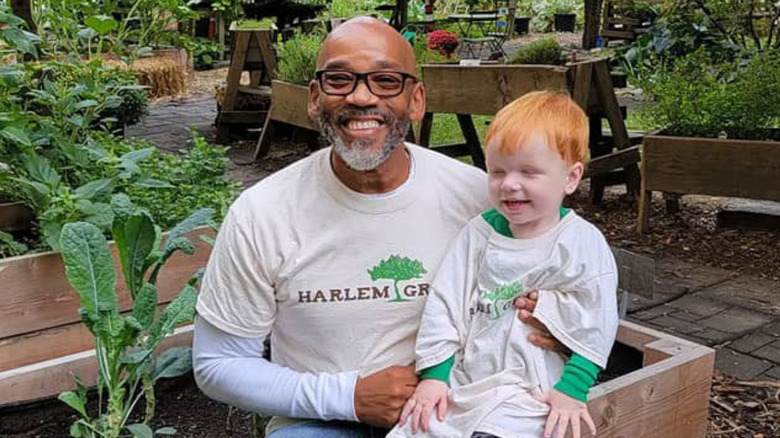Lidia Bastianich Shares How An Urban Garden Changed Lives
In Lidia Bastianich's new special "Lidia Celebrates America: Overcoming The Odds," viewers meet several incredible people and hear their inspiring stories of perseverance. One of these people is Tony Hillery from Harlem, New York, who after experiencing personal hardship found himself on a mission that changed not only his life, but the future of his entire community.
Hillery shares in the film that after his business went under during the recession in 2010, he felt directionless and depressed. With his wife's encouragement, he began volunteering in the lunchroom of a local school. "You could see firsthand a lot of the challenges of a community such as this," he said of his time there. "Especially when it comes to food and nutrition." The job opened his eyes to the reality that the kids and their families were stuck in a food desert, which the Annie E. Casey Foundation describes as an area where residents often live in poverty with no affordable, accessible options for healthy food.
Hillery turned his attention to an abandoned community garden near the school, which was so dilapidated and full of refuse that the local kids referred to it as the "haunted garden." Bastianich shares that as Hillery worked to clear out the space, a young child from the neighborhood came to him with a suggestion: To plant a seed.
This community is thriving, all thanks to a garden
In Lidia Bastianich's special, we meet Nevaeh Seeley, who first made that suggestion to Tony Hillery as a young child. "She planted the idea by telling Tony, 'Why don't we plant a seed?'" Bastianich shares. "And a seed was planted." Of course, it was much more than just a literal seed going into the ground: Hillery's idea sparked something in the children and his neighborhood that also began to grow. Seeley is now 14 and still helps in the garden, sharing that tomatoes are her favorite thing to grow. Hillery says in the film that many children taste vegetables for the first time when they come to the community garden, and love to grow their own. "They were coming after school to visit their plant," he says. "They would bring the parent on the weekend to show them their plant."
Today, Hillery's organization, Harlem Grows, gives over 6,000 pounds of free food each year to local communities. According to the website, he has transformed vacant lots across the city into 10 urban farm sites that include traditional and hydroponic gardens. Harlem Grows offers workshops, summer camps, and hosts several events for residents like fairs and holiday festivals. Entire communities now benefit from Hillery's vision and perseverance, and for him it always starts with the children. "When you plant a seed in a child's mind [it's] always growing," he says. "It's not just about health, it's about life."

